ABM Archive Website
THIS WEBSITE CONTAINS ARCHIVE MATERIALS FOR HISTORICAL REFERENCE ONLY
For up-to-date information, including our latest appeals, news, and resources, please visit our current website.
Reflections on my time in PNG
November 14, 2016
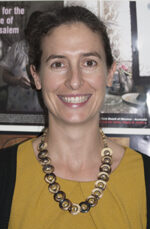
About Meagan Schwarz (neé Morrison)
Meagan began missionary life in 2002 as a teacher at Holy Name School, the Anglican Church of PNG’s (ACPNG) secondary school at Dogura, Milne Bay Province, supported by the Anglican Board of Mission-Australia (ABM). After returning to Australia in 2004, she worked in government, completed her Masters in Public Health and was an active member of ABM’s Board and Development Committee. Meagan returned to PNG in August 2009 for 2 ½ yrs to volunteer with Anglicare PNG, through Australian Volunteers International (AVI) in partnership with ABM. Then, from April 2013 until June 2016, Meagan worked as ABM’s PNG Program Coordinator and Partner Liaison Officer, based in Port Moresby. In February 2015, Meagan married her husband, Nick, a Lutheran Missionary working at the Melanesian Institute and moved to Goroka. They returned to Australia in May 2016 and welcomed their first daughter, Victoria Hope, on 1 July. Meagan maintains an active interest in matters relating to ACPNG, ABM and PNG in general, as well development and mission issues more broadly.
Meagan’s varied experiences in ‘mission’ in PNG provides an interesting perspective that reflects the changing nature of mission practiced and experienced by ACPNG and ABM. In this article, Meagan reflects on what she has learnt about mission.
God’s promise
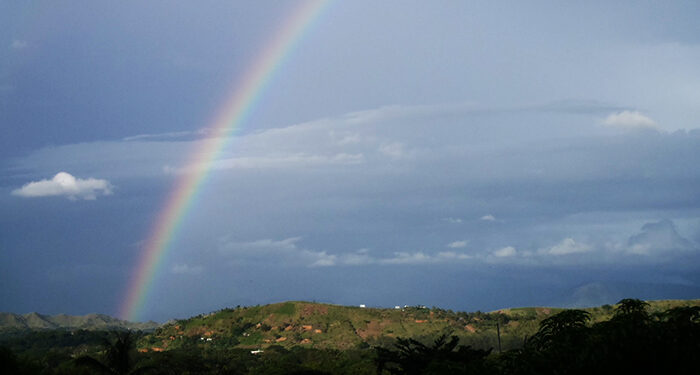
I saw a lot of rainbows during my time in PNG. Each time I saw one, I was reminded that we do mission because God promised to be with us, to prosper us, and that no matter how dark or lonely or hopeless a situation may be, God is at work. During my 7 ½ yrs in PNG I have experienced my share of troubles – from uncooperative weather, phone and internet connections and dinghy, truck and plane engines, to working through differences and misunderstandings with colleagues and sadly, helping our partners to manage poor performance. But each time God also provided me with many ‘rainbows’ in the form of supportive colleagues and friends and random acts of kindness from strangers. Visiting the communities where ACPNG and ABM support projects was also a great rainbow.
The Body of Christ
As I travelled around PNG, I was usually welcomed with the local customary cry – Oro! Egualau! Kaiwa! Huse! Each language group both different and similar to those around it. I was constantly reminded of how important it is to acknowledge and respect the differences between people, cultures, churches and countries, and to find a way to celebrate them and draw from those different perspectives, rather than see them as obstacles. That’s not to say those differences didn’t pose challenges to my work – adult literacy resources developed in Tok Pisin were well received by students of the Anglican Adult Literacy Program in some areas where Tok Pisin is the common second language, but less so where English is the preferred second language. Sadly this had not been thought about during planning so funding had not been included to allow for translation. In PNG, and elsewhere, the importance of context (cultural, political or even environmental) is very important – but we should try and see those differences as being part of the diverse Body of Christ, and finding out how God is using those differences to achieve God’s Mission, rather than fighting against them.
Finding the blessing
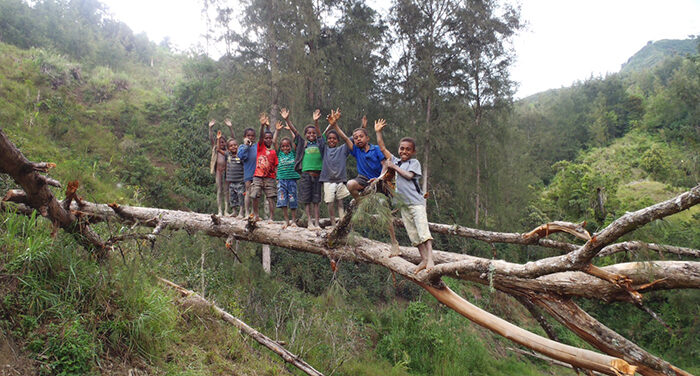
Most of us would find a tree fallen across a road most annoying, disruptive and NOT a reason for celebration and play – not these children near the village Kaironk, near Anglican Mission station at Simbai, in the mountain ranges south of Madang. I have learnt from my PNG friends and colleagues (and their children!) that when working in mission it is important to keep a positive attitude, to look for the blessing in what initially looks like a curse – and to even sometime find the fun side in a situation.
Starting again

There were times during my work in PNG when some crisis required a complete stop and a reassessment of what was happening. That crisis may have been in relationships or with a program or even external to us. People familiar with PNG will know that roads are particularly prone to such crises. Rural roads, some little more than goat tracks, are often cut by landslips or floods, making it impossible (at worst) or dangerous (at best) to pass until heavy machinery or manual labour had created a temporary crossing. Rebuilding the road meant going back to the foundation and starting again, or finding another more suitable, less crisis prone path. While it was often possible to continue some aspect of our work during such a time, some situations required a complete re-think of goals and approaches. Or we needed to rebuild trust and respect and allow time for wounds to heal before we could start again. I learnt that we shouldn’t be afraid, when working in God’s mission, to start again, or use disruptions as a chance to check that we are doing the best we possibly can, that we haven’t been blinded to other ways of doing things because we got comfortable with what we had been doing. Sometimes the crisis can be the catalyst for being more attuned to God’s mission, rather than our own!
Receiving
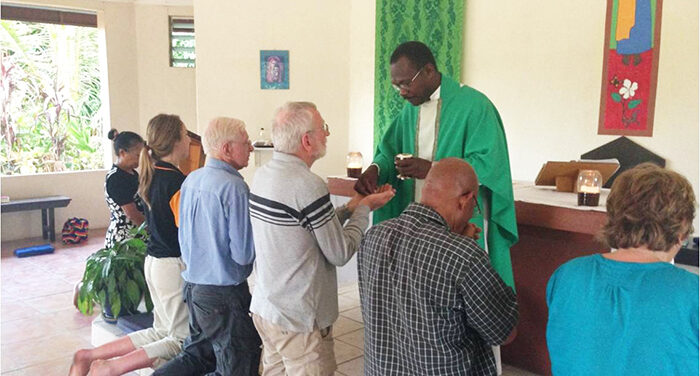
Finally, I learnt that in Mission it is essential that ‘we’, the ones in the ‘sending’ churches, who normally think we have the expertise, money, solutions etc need to be ready to receive from our brothers and sisters in the partner churches. Being part of ABM’s Modawa Pilgrimage has been a blessing to me – seeing the Pilgrims take that journey of becoming the ones who don’t know how to do something, what the solution is to the ‘problems’ they see (which may not be the same as the problems that our brothers and sister see) and who then become more open to receive from the PNG Anglicans we met – from receiving communion from a PNG priest, to accepting a stabilising hand when crossing a river or climbing a mountain or getting into or out of a dinghy, and being able to simply sit with a new friend and hear their story, often laughing and crying with them and then walking away, knowing that we will return to our comfortable lives, but still having hope that God is at work in this. I now realise that it is only when we let go of our desire to ‘do good’ that we can enter this uncomfortable space. This then allows us to really listen to those who really know – our PNG friends – about what is going on. It gives them space to step up and into a role which so often they have deferred to others. It is our role to encourage them and support them to do this – even if it means that we do something we aren’t initially comfortable with, even if they stumble and trip – don’t we when we’re walking their roads?
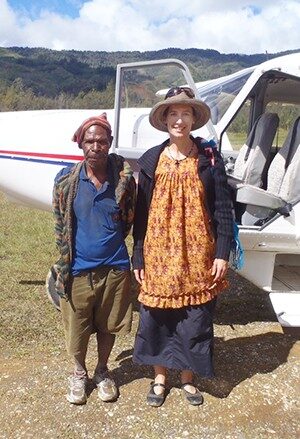 |
The challenge of mission today
I believe this is the challenge of mission we are called to today– we need to humble ourselves to hear and follow God’s voice into a new dawn of relationship with our partners. There will be differences we need to celebrate and work through, allowing them to bless us; some obstacles may actually be blessings or at least a chance to laugh and learn; other times we may need to start again completely; and most importantly we need to assume a new position, where we are not the ones with the power and answers, but are simply a companion on the road, who has experiences to share with our friends, but as much to learn from them as they can learn from us. If we can accept this challenge, then we will realise God’s promise for life in all its fullness for all of God’s creation.


